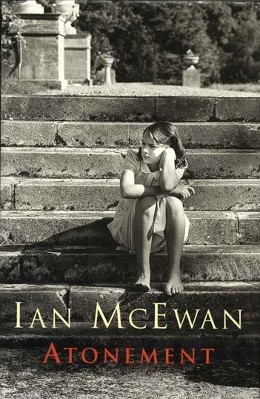Since Classical Pursuits went online at the beginning of the pandemic, leader and philosopher Wendy O’Brien has been nothing of short of a force of nature. She’s led seminars on Montaigne, 20th-century women painters, and much more. Her latest seminar is on Ian McEwan’s 2001 novel Atonement. This novel went on to win numerous awards and appear on many “best novels” lists. If you have read it, you know what a special novel it is. Enthralling and full of pointed questions with no easy answers, it is a great book to discuss as a group. Wendy will her bring her trademark enthusiasm and thoroughness to what promises to be a lively and provocative discussion. Her seminars usually sell out, so reserve your place today!

published by Jonathan Cape, 2001
Melanie Blake: I am very happy Classical Pursuits is doing a seminar on Atonement. I read it a few months after it came out in paperback in the US, which I think was in 2003. I read it over the course of a hot summer day, unable to put it down until I literally dropped it after reading the last lines. I had been sitting at the top of some stone steps and I watched the book tumble down them, unable to move. It might seem overblown to say, but it’s not—reading Atonement felt cathartic. What drew you to doing a seminar on this novel?
Wendy O’Brien: What a great word for the experience of reading this novel!!! I think that is what this is a story about—it is a story about the stories we tell and the stories we believe. And, most important, it’s about the consequences of those stories. It gets us to think about the practice of reading while we are in the act of reading.
Like you I have a clear memory of the day I finished the book. I had ordered it from the UK. It came special delivery and I sat down and read it from cover to cover. When I hit the ending … my breath was taken away. I loved it! I still do! What had McEwan accomplished here? How had he elicited this response from me? I want to spend some time thinking about this as I explore this work with others.
MB: What are some of the main themes you hope to take on with the group?
WO: The book lends itself to considering questions about the nature of memory, the ethics of forgetting and the value of narrative.
MB: In an interview appearing in the Guardian and elsewhere following the publication of Atonement, McEwan said that “novels are not about ‘teaching people how to live but about showing the possibility of what it is like to be someone else. It is the basis of all sympathy, empathy and compassion. Other people are as alive as you are. Cruelty is a failure of imagination’”. How as readers do we remain fully attuned to this possibility?
WO: It’s part of the magic of great novels, isn’t it? We read the words on the page and somehow slip into the lives, under the skin of others who live lives far removed from our own. McEwan achieves this with his careful choice of scenarios, scenarios in which his characters unfold, in his attention to detail and his mastery of craft. We know these characters. We find something of ourselves in them. The universal lies in the particular. And he reveals this, enacts this line after line, chapter after chapter of this novel.
MB: As the book draws to a close, Briony asks, “how can a novelist achieve atonement when, with her absolute power of deciding outcomes, she is also God? There is no one, no entity or higher form that she can appeal to, or be reconciled with, or that can forgive her. There is nothing outside her. In her imagination she has set the limits and the terms. No atonement for God, or novelists.”
Is Briony letting herself off too easily? Is there still too much of her 13-year-old self insisting on the creation of order through fiction?
WO: From the moment we pick up the novel, this is the question we are asked to consider. Is it absolution that the novelist seeks? Can it be achieved? I’ve read this book over and over and … well, if I’m honest I still don’t know. I still don’t even know if Briony asks this question as she seeks absolution, or if [asking the question] is a way to escape ever having to do just that—as a novelist and as an individual.
MB: Treading lightly to avoid spoilers! Reviewers called the ending of Atonement everything from “coup de théâtre” (Publishers Weekly) to “unnecessary” (New Republic) to “too lenient” (Spectator) to “a kind of lunacy” (Weekly Standard). Little love for the postmodern here. Where do you stand?
WO: Oooooo … I love the ending! As I mentioned, I gasped.
MB: I loved it too. Readers, decide for yourselves in Wendy’s seminar starting March 17.
Featured image: A still from the 2007 film, Filmgrab.com


